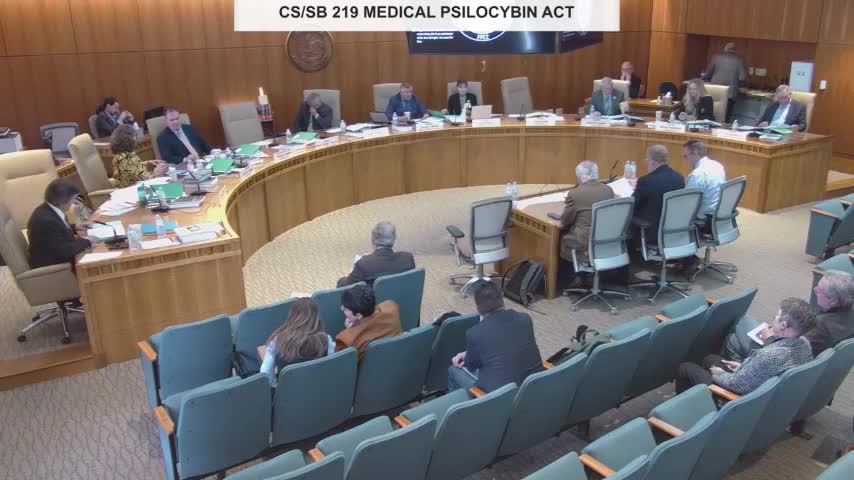Senate committee advances medical psilocybin bill after hours of testimony
Get AI-powered insights, summaries, and transcripts
Subscribe
Summary
Senate Finance Committee members voted to advance the Senate Judiciary committee substitute for Senate Bill 219, which would create a state‑regulated medical psilocybin program for four initial behavioral‑health conditions and authorize the Department of Health to set licensing, production and treatment rules.
Senate Finance Committee members voted to advance the Senate Judiciary committee substitute for Senate Bill 219, a measure to create a state-regulated program to provide medical psilocybin in supervised clinical settings for a limited set of behavioral health conditions.
Senator Joseph Campos, sponsor of the committee substitute, told the panel the bill sets up a medical program that the Department of Health would regulate and license, and that the program would be available only in clinical settings. The bill as written names four initial qualifying conditions: post-traumatic stress disorder, major treatment‑resistant depression, substance use disorder and end‑of‑life anxiety; the secretary of health would be able to add conditions by rule. The bill’s implementation date in bill language is tied to 12/31/2027.
Supporters, including veterans and clinicians, described clinical settings in which trained facilitators and licensed providers guide multi‑hour sessions followed by integration therapy. Retired Army Master Sergeant Crystal C. Romero testified that after trying many other treatments she found lasting relief from psilocybin therapy and urged passage. “Passing SB 2 19 is more than compassion. It’s fiscal responsibility,” Romero said, adding that veterans often travel out of state or out of country and pay thousands for treatment. Clinical witnesses described a small number of sessions with psychotherapy and licensed oversight, and researcher Larry Newman, M.D., told the committee that, in clinical settings, “psilocybin is probably the least of any substance of abuse for addictive potential.”
Why it matters: backers said the bill would create a regulated option for people with treatment‑resistant conditions and a research component; opponents and some senators asked questions about safety, liability, production, licensing, insurance coverage and the potential for recreational diversion. Committee members and witnesses discussed safety protocols, oversight roles for the Department of Health and an equity fund for people who could not afford treatment.
Key details discussed at the hearing - Funding: The sponsor said House Bill 2 already contains $2,000,000 tied to stand‑up of the program. Campos said he was working to shift $500,000 of that to UNM research and leave $1.5 million with the Department of Health to staff rulemaking and initial implementation. The sponsor described the appropriation as currently handled in the budget rather than the bill language. - Access and cost: Witness Crystal C. Romero said she received a scholarship to pay for an out‑of‑country retreat she attended; she said retail price for a full course of therapy can be about $6,000. Committee members were told that, presently, insurance and Medicaid do not cover medical psilocybin and patients would have to pay unless coverage changes in the future. - Licensing and production: The bill directs the Department of Health to set standards for who may provide treatment, the clinical setting, acceptable producers and dosing. Dominic Zirlo of the Department of Health told the committee that the department expects to license in‑state producers and to include travel/per diem for advisory board members in start‑up costs. - Safety and clinical model: Clinicians described treatment as multi‑hour supervised sessions with preparatory and integration psychotherapy; witnesses cited Oregon and research centers such as Johns Hopkins and UNM as models. Dr. Newman said most risks arise when unsupervised; in a clinical setting, he said, risks are managed.
Action and vote - Motion: “Do pass on the Senate Judiciary committee substitute for Senate Bill 219” (mover: Senator Campos; second: Senator Bison). - Vote (as recorded in committee): Senator Brandt — yes; Senator Campos — yes; Senator Lanier — yes; Senator Padilla — no; Senator Steinborn — yes; Senator Tabiason — yes; Senator Trujillo — yes; Senator Woods — no; Senator Shandoh — yes; Senator Muñoz — no. Outcome recorded as: approved (do pass).
What the bill does not do - The bill does not require insurance or Medicaid coverage at present; committee members were repeatedly told coverage would be a later policy decision. - The bill does not create a retail or recreational market; sponsors said the program is limited to licensed clinical settings and in‑state licensed producers.
Next steps and outlook Senate Bill 219 moves forward with a committee recommendation to pass. Committee discussion focused on rulemaking authority for the Department of Health, a research and equity fund, and ensuring the licensing and quality‑control framework would prevent unsupervised use.
Sources and attribution: reporting is based on sworn testimony and exchanges on the Senate Finance Committee hearing where witnesses included Crystal C. Romero (retired Army master sergeant), Jeffrey Holland (clinical therapist), Dr. Joel Rose (family physician), Dr. Larry Newman (UNM physician/researcher) and Dominic Zirlo (Department of Health).
